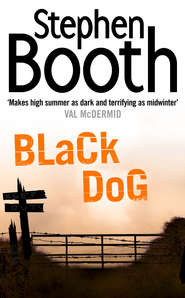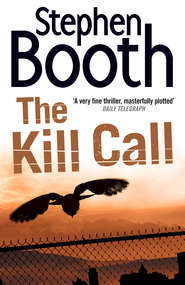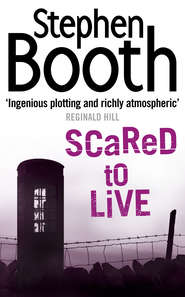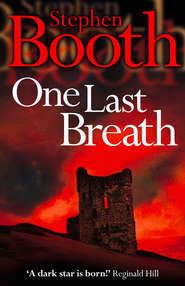По всем вопросам обращайтесь на: info@litportal.ru
(©) 2003-2024.
✖
Blind to the Bones
Автор
Год написания книги
2019
Настройки чтения
Размер шрифта
Высота строк
Поля
‘What about the barn conversion?’
‘Holiday lets,’ said Udall. ‘It’s divided into two studio apartments, with a shared patio round the back. No doubt they provide a useful bit of extra income, in case the crematorium market dries up.’
‘Not much chance of that. There’s no shortage of people to burn. And nowhere to bury them these days, either.’
‘No, the graveyards are really in demand. People are dying to get in them.’
‘Is that one of Sergeant Boyce’s, too?’
Udall flushed a little, but said nothing. She tugged at the bottom edge of her vest to pull it down over her hips, where her duty belt was heavily hung with baton, handcuffs, CS spray, and a series of leather pouches that Cooper had forgotten the use for. In fact, he didn’t think they even had all those things to wear in the days when he was in uniform. Changes happened fast in the police service, and six years away from a uniform was long enough to get out of touch.
Tracy Udall had dark hair pulled back almost painfully tightly into a short ponytail that protruded from her white trilby-style hat. Cooper had presumed from what she’d told him that the father of her child hadn’t been around from the word go. Now she must be only a couple of years on the other side of thirty. Unfortunately, Sergeant Jimmy Boyce was married, with four kids of his own.
Cooper knew he could probably learn a lot from PC Udall and her colleagues – the day-to-day, on the ground stuff about policing that had started to pass him by after six years at a CID desk in Edendale. It was his chief superintendent at E Division who had first uttered the words ‘lateral development’ when he had failed to get promoted to the detective sergeant’s job he had hoped for. Lateral development meant a move to a different speciality without the benefit of promotion, but it came with the suggestion that wider experience might count favourably towards future advancement. On the other hand, his mother might have said it was just a case of ‘always jam tomorrow’.
Yet, suddenly, here he was on a secondment to the Rural Crime Team – playing an advisory role to Sergeant Boyce’s pro-active squad of uniformed officers. These were people who knew the problems of the Peak District’s villages. They had gained their knowledge from years as community constables, liaising with the local people and listening to their troubles. Those troubles often involved a catalogue of burglaries, petty thefts, vandalism and car crimes that were committed with impunity, to all intents and purposes. Prioritization was the buzz word these days, and property crime was low priority. Members of the public in some areas could consider themselves lucky if they got any police response at all, except for the offer of a crime number for their insurance claim and a sympathetic letter from Victim Support.
Cooper was glad to help, if he could. But while he stood with PC Tracy Udall on this roadside in the Longdendale valley, he couldn’t help wondering if this was the first step on the path of his lateral development. Was Sergeant Boyce tipped to move onwards and upwards after the initial success of his team? Did a uniformed sergeant’s job await some lucky detective constable in a few months’ time? He wondered what Detective Sergeant Diane Fry would make of that, as his immediate supervisor. But it didn’t take much effort to imagine the smile on her face. She would be glad to be rid of him, he was sure of it.
Now Cooper was standing in sunlight, and he found he was sweating under his waxed coat. It was one of those spring days when you didn’t know what to wear when you went out in the morning. Whatever you chose, you knew you were going to get wet, or too warm. Probably both. There was nothing predictable about the weather in the Peak District at any time of the year, no matter how long you lived there. Outdoors, you were forever taking off layers of clothing and putting them back on again, as you passed from sweaty uphill slog to the biting wind of an exposed plateau. In April, you never knew from one moment to the next what sort of weather was going to hit you. A squall, a gale, a deluge of hailstones, or a warm burst of sun – you could get it all within an hour.
Down in the converted farmhouse, the suspects roused from their beds would be getting ready for a trip. With a bit of luck, they wouldn’t be seeing much sunlight for a while.
‘An isolated farmhouse is an ideal base for an illegal operation. And God knows, there are plenty of those between here and Edendale,’ said Udall.
‘Too many,’ said Cooper.
‘And they make great drugs factories particularly. It’s taking diversification a bit far, if you ask me. Definitely too far. If they can’t make a living at farming, they should stick to opening tea rooms and doing bed and breakfast.’
‘But there’s more money in drugs. And you don’t have to deal with tourists.’
‘The neighbours are going to get a shock,’ said Udall. ‘You can see they’ve got no security to speak of. There are no walls and no gates, and the lights are mostly to show off the garden and the fish pond. And the Afghan doesn’t look as though it would put up much of a fight.’
‘People are used to thinking that they don’t need to set up fortifications around their homes in this area.’
‘Ah, but the architect isn’t from this area. He lived in Sheffield until two years ago. He ought to know better.’
‘It’s the scenery,’ said Cooper. ‘It gives people a false sense of sanity.’
If Cooper were to be honest with himself, his short spell with the E Division Rural Crime Team was already starting to feel like a breath of fresh air. Winter in Edendale had been long and hard, and full of other complications. Diane Fry, for one.
And then he had chosen to move out of Bridge End Farm for the first time in his life. He had left home at almost thirty years old, and now he had all the business of looking after himself, and the unexpected implications of having property, even though his flat in Edendale was only rented. He had his own territory now, and that made life look different. That, and his looming thirtieth birthday, made a lot of things look different. It was as if he had suddenly been lifted out of his old, familiar rut and pointed in a different direction, so that he wasn’t quite sure who or what he was any more. In fact, he was a bit like the former farmhouse down there – designed for a different purpose entirely.
‘Besides, houses like this need security these days. Almost every house of any size in Longdendale has been targeted by thieves during the last eighteen months or so,’ said Udall. ‘Some of them have been hit more than once. If the thieves don’t get in the first time, they do a recce and come back later.’
‘Professionals, then?’
‘No doubt about it.’
‘Local? Or the travelling variety?’
‘Well, we definitely think they’re using somewhere on our patch to store the stuff they’ve nicked. Another isolated farmhouse, probably.’
‘What items are they going for?’
‘This lot go for antiques: clocks, porcelain – anything small that looks as though it might be worth a bit of money. There’s a huge market for that kind of thing. It’s likely they’re collecting enough for a vanload, then shipping it off to the States or somewhere in Europe. Easy money, all right.’
The Shetland pony was deliberately bullying the two Muscovy ducks, nudging them around the paddock until they began to flap their wings and quack angrily.
‘Did the architect design the alterations himself?’ said Cooper.
‘I believe so. But he seems to have designed them for looks, rather than with security in mind, doesn’t he?’
‘You’re right. He really should have known better. Here they come.’
The task force officers were escorting two men out of the target house. Each man had his hands cuffed behind his back and an officer gripping his elbow. They looked as though they had dressed hastily in whatever had come to hand first. Much as Cooper had done himself, in fact. But these two would have the chance to put their feet up for a while in a warm, dry cell when they reached the section station at Glossop.
Cooper turned the binoculars westwards, looking for more signs of civilization in the bare Dark Peak landscape of peat moors and heather. His attention was caught by a small, tree-lined valley and the glimpse of a church tower.
‘What’s over there?’ he said.
‘That? Oh, that’s Withens.’
Cooper could hardly see the village itself. It seemed to be lying in the bottom of a hollow, slipped casually into a narrow cleft in the moors. There were trees above the village on the lower slopes, through which the roofs of houses were barely visible. But the valley was so narrow that it looked as though the two facing slopes were only waiting for the right moment to slide back together and crush the village completely, and all its inhabitants with it.
‘Withens,’ said Cooper, trying the sound of the name in his mouth as he might taste an unfamiliar morsel of food, not sure whether it was going to be bitter or sweet, soft on the teeth or difficult to chew.
Above the village was a moorland plateau, a gloomy blend of dark khakis and greens, with no sign of the purple flowers of the heather that would bring colour in the summer. Much of the landscape up there would be quagmire – a wet morass of peat bog that shifted underfoot, sucking at the soles of boots and clinging to trousers. Across the valley, Bleaklow Mountain stood right on the watershed of England, and attracted sixty inches of rain a year to its wastes of haggs and groughs.
‘I thought we’d go down to the village and take a look when we’ve finished here,’ said Udall. ‘You might be interested to see it. Withens has its own problems. As it happens, the local vicar reported a break-in yesterday.’
‘Fine.’
Cooper noticed a pair of black shapes in the distance, circling over the moor. He turned the binoculars towards them, grateful for any sign of life in the landscape.
But this wasn’t the sort of life he welcomed. They were carrion crows. Though he couldn’t see what had attracted them, he guessed they probably had their eye on a weak lamb. Sometimes, before shearing, their prey might be an adult sheep that had rolled over and couldn’t get up again because of the weight of the unshorn fleece on its back. But in the spring it was the sickliest lambs that the crows were looking for as they flapped and circled over the moors. Just now, their diet would consist mostly of young grouse and the eggs of other birds. But a weak lamb was a great bonus. Its carcass would last them for days.
If they’d found a lamb up there, then they would land in a little while and perch on a handy rock as they waited patiently for it to weaken enough to be helpless. Then they would begin to work on its eyes, picking at the white flesh as if they were delicacies that had to be eaten fresh. And once the lamb was blind, the crows could eat the rest of it at their leisure, while it died.
Cooper lowered the binoculars and looked up at the dark bulk of the hills beyond Withens.
‘Tracy, have you noticed the smoke?’ he said.
Udall followed his gaze. ‘Hell!’
Black clouds were billowing across a wide stretch of the moor, with an occasional flicker of flame visible behind them. The seat of the fire looked as though it might be just below the horizon. PC Udall went off to her car to use the radio, but was back in a couple of minutes.
‘Moorland fire. They think it was started by some kids on a school outing from Manchester. The fire service are turning out all the crews they can muster, but it’s right on the summit above Crowden, so it’s pretty inaccessible. The poor bloody firefighters will have to do the last half-mile on foot with their equipment. They’re also saying they might have to mobilize the helicopter to bomb it with water from the reservoirs.’











